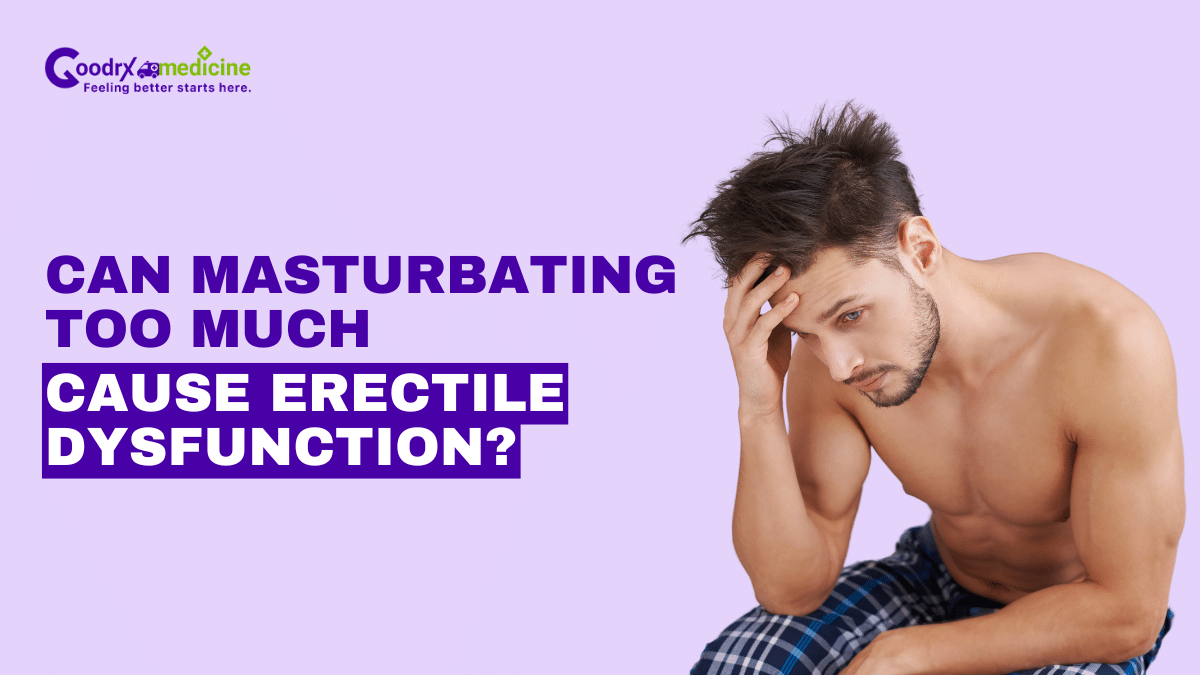Masturbation is a healthy part of human sexuality. It is a private activity that many people engage in for pleasure, stress relief, or relaxation. However, some men begin to worry if frequent masturbation could lead to problems like Erectile Dysfunction (ED).
It is a valid concern, especially in an age where access to adult content is easy, and habits can sometimes become excessive.
This article will answer the question: Can masturbating too much cause Erectile Dysfunction, in detail. We’ll also look at the facts, the myths, and what science says about this topic.
What causes Erectile Dysfunction?
Erectile Dysfunction is the inability of a man to get or keep an erection firm enough for sexual intercourse. It can happen occasionally to anyone, especially under stress or fatigue. But if it happens regularly, it may point to a deeper issue, physical or psychological.
ED is more common in elderly men, but it can affect younger men too. Causes may include:
- Poor blood flow to the penis
- Nerve damage
- Low Testosterone
- Sexual performance anxiety
- Depression
- Side effects of medications
Now the question is—can masturbation be added to this list?
Save up to 90% on your medicine bills

Cenforce 100 mg

Cenforce 200 mg

Kamagra Oral Jelly Rx 100 mg

Vidalista 60 mg
How often is too often?
There’s no fixed number for how much masturbation is considered too much. What matters is how it affects your life. If you masturbate so frequently that it causes physical discomfort, emotional stress, or interferes with your daily responsibilities and relationships, it may be a problem.
Doctors generally agree that masturbation is not harmful when done in moderation. But excessive masturbation, especially when combined with frequent porn consumption, can sometimes cause sexual health issues, including temporary erectile problems.
Can masturbating too much cause Erectile Dysfunction?
The short answer is: not directly, but it can contribute to erectile difficulties in certain cases.
Let us understand the link between masturbation and ED:
Psychological dependence on porn
Frequent masturbation, especially when it involves watching porn, can affect how your brain responds to real-life intimacy. Over time, some men find it difficult to get aroused without visual stimulation. This is called Porn-induced Erectile Dysfunction (PIED).
In such cases, the brain becomes so used to instant, high-intensity visual content that real-life sexual experiences don’t produce the same excitement. This leads to trouble getting or keeping an erection during actual intercourse.
Desensitization
When someone masturbates multiple times a day over a long period, it may reduce their sensitivity to touch. This means it might take longer to get aroused or achieve orgasm, both alone and with a partner. This can also contribute to delayed or weak erections.
Mental pressure
Some men feel guilty or anxious about frequent masturbation. This guilt or stress can interfere with sexual performance. Anxiety is one of the common psychological causes of ED. When the mind is under pressure, it can interrupt the brain signals responsible for sexual arousal and erection.
Performance anxiety
Men who masturbate a lot may unconsciously create unrealistic expectations about their sexual performance. This can cause nervousness during actual sex, leading to erection difficulties.
What does science say?
There is no strong evidence that masturbation directly causes permanent ED. However, research has shown that excessive porn use and compulsive masturbation can lead to sexual dysfunction, especially in young men.
A study aimed at finding the relation between pornography use and masturbation published 2023 showed that men who frequently watched porn and masturbated had a higher chance of developing sexual problems with a partner.
Another study found that men who masturbated compulsively reported more sexual dissatisfaction and lower sexual confidence.
So, while masturbation itself is not dangerous, the context in which it is done and its frequency can impact sexual health.
Signs you might be masturbating too much
Here are a few signs that may indicate you need to take a break:
- You prefer masturbation over sex with your partner
- You feel tired or unmotivated after masturbating
- You experience numbness or soreness in the genitals
- You feel guilty, ashamed, or anxious afterward
- You’re unable to get aroused during real-life intimacy
- You find it hard to control the urge despite trying
It may be time to consider making changes if you relate to these signs.
Tips to restore healthy sexual function
If you think excessive masturbation is affecting your erections, the good news is that recovery is possible. Many men have reversed their symptoms by making small changes in their daily lives.
Here is what you can do:
- Try going without masturbation or porn for a few weeks. This helps your brain reset and re-sensitizes your natural sexual response.
- Switch from visual porn to using your imagination. This can gradually help your mind reconnect with real-world sexual arousal.
- Exercise boosts Testosterone and improves blood circulation, both crucial for strong erections.
- Lack of sleep affects hormone levels and sexual desire. Try to get 7–8 hours of good sleep every night.
- If you feel addicted or if performance anxiety and guilt are interfering with your sexual health, speaking to a therapist can help.
When to see a doctor
Occasional erection problems are common and usually not serious. But if you experience the following, it is best to consult a doctor or sex therapist:
- Struggle with ED for more than a few weeks
- Notice a sharp drop in sexual interest
- Experience pain or discomfort in your genitals
- Feel mentally distressed about your sexual habits
Conclusion
Masturbation, when practiced in moderation, is a normal and generally healthy sexual activity. But, can masturbating too much cause Erectile Dysfunction? It does not directly cause ED. However, excessive or compulsive masturbation, particularly when combined with frequent porn use, can negatively impact your sexual health.
It may lead to temporary erection problems, reduced sensitivity, or mental issues such as anxiety, guilt, or unrealistic expectations. If your habits begin to affect your physical, emotional, or sexual health, it’s important to pause, reflect, and take corrective steps.
In most cases, simple lifestyle changes and a short break from overstimulation are enough to restore natural sexual function. But if the issue persists or begins to affect your quality of life, professional guidance should not be delayed.
Being aware of your body, understanding your limits, and seeking support when needed are essential steps toward long-term sexual wellness.
Frequently Asked Questions
Can people with Erectile Dysfunction masturbate?
Yes, you can have Erectile Dysfunction, but you can still masturbate. While achieving a full erection may be difficult, arousal and orgasm are still possible in many cases. Focusing on sensations rather than performance can help. Using stimulation techniques or sex toys may enhance pleasure despite erection challenges.
How to masturbate with Erectile Dysfunction?
Masturbating with ED involves exploring what feels good without pressure to get fully erect. Use gentle touch, focus on erogenous zones, and try lubricants or massagers to increase sensitivity. Relax, take your time, and prioritize pleasure over performance. Avoid stress or distractions that may affect arousal.
Does quitting masturbation cure ED?
No, quitting masturbation alone may not cure ED, but it can help if the issue is linked to overuse, porn addiction, or mental fatigue. Breaking may reset arousal patterns, improve sensitivity, and reduce anxiety. However, if medical issues cause ED, professional treatment is still needed.
Is it normal to lose morning erections with frequent masturbation?
Yes, frequent masturbation, especially before sleep, can reduce the chances of experiencing u003ca href=u0022https://www.goodrxmedicine.com/blog/mens-health/why-do-men-get-morning-wood/u0022u003emorning erectionsu003c/au003e. This doesn’t always mean a problem, but if morning wood stops completely and consistently, it could signal underlying issues worth discussing with a doctor or therapist.u003cbru003e
When referencing outside resources, GoodrxMedicine always provides full citations. To learn more about the measures we use to maintain the quality of our content, please review our Content Information Policy.











